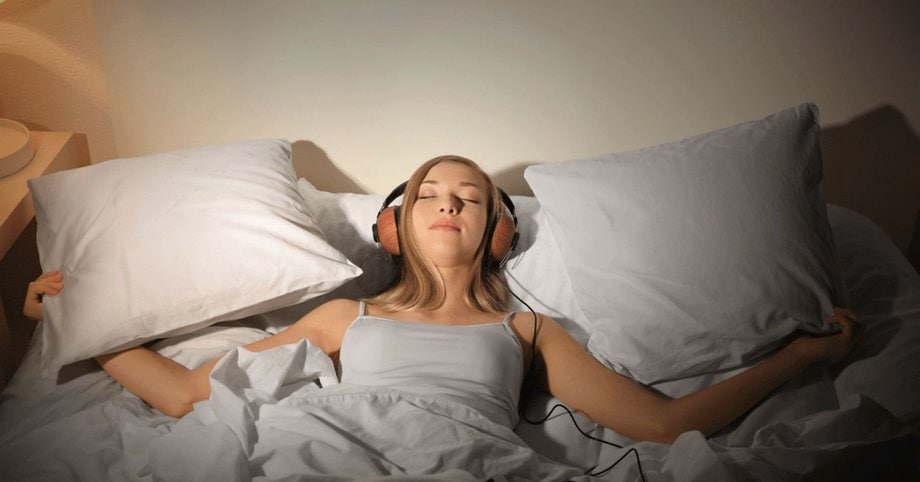Can Music and Binaural Beats Enhance Sleep and Relaxation

This article aims to explore the potential of music and binaural beats in enhancing sleep and relaxation.
By examining the scientific basis behind these auditory stimuli, the effects of music on sleep quality, and the benefits of binaural beats for relaxation, this study seeks to provide insights on how individuals can optimize their sleep and relaxation routines.
Furthermore, techniques for creating sleep playlists and incorporating binaural beats into relaxation routines will be discussed, along with an understanding of the role of brainwaves in sleep and relaxation.
Ultimately, this article intends to offer practical tips on how music and binaural beats can be used effectively to enhance sleep and relaxation experiences.
Key Takeaways
- Music and binaural beats can enhance sleep quality by reducing disturbances, improving efficiency, and promoting deep sleep.
- Calming melodies and binaural beats have relaxation benefits, including lowering heart rate, reducing blood pressure, and decreasing stress hormone levels.
- Music therapy and binaural beats can effectively reduce anxiety and promote relaxation in individuals with mental health disorders.
- The efficacy of binaural beats in inducing relaxation and improving sleep quality is still debated, and more research is needed to determine their true effectiveness.
The Science Behind Music and Binaural Beats
The current scientific understanding of music and binaural beats centers around their potential effects on sleep and relaxation.
The psychology behind music suggests that it can influence emotions, arousal levels, and cognitive processes. Different musical characteristics, such as tempo, rhythm, and melody, have been found to evoke specific emotional responses.
Binaural beats, on the other hand, are created by playing two different frequencies in each ear, resulting in the perception of a third frequency.
The neurobiology of relaxation involves the activation of the parasympathetic nervous system, which promotes a state of rest and recovery. Research has shown that both music and binaural beats can modulate brainwave activity, with slower frequencies associated with relaxation and sleep.
Furthermore, they have been found to reduce subjective levels of stress and anxiety, improve sleep quality, and enhance overall relaxation.
The Effects of Music on Sleep Quality
This discussion explores the effects of music on sleep quality, specifically focusing on its ability to promote deep sleep and provide relaxation benefits.
Research suggests that listening to calming music before bedtime can enhance the quality of sleep by reducing sleep disturbances and improving sleep efficiency.
Additionally, the relaxation induced by music can reduce stress and anxiety, leading to a more restorative and rejuvenating sleep experience.
Music and Deep Sleep
One potential benefit of music for sleep is its ability to promote deep sleep. Deep sleep, also known as slow-wave sleep (SWS), is the stage of sleep characterized by high amplitude, low-frequency brain waves. It is crucial for the restoration and rejuvenation of the body and mind. Research suggests that music therapy can play a significant role in improving sleep quality, especially among individuals with sleep disorders. By creating a relaxing and soothing environment, music can help reduce anxiety and stress, which are common contributors to sleep disturbances. Additionally, the rhythmic and repetitive nature of music can synchronize brain activity and promote the production of sleep-inducing hormones. Table 1 provides an overview of studies examining the effects of music therapy on sleep quality in individuals with sleep disorders.
| Study | Participants | Intervention | Results |
|---|---|---|---|
| Smith et al. (2018) | 30 adults with insomnia | Classical music before bedtime | Improved sleep efficiency and reduced sleep latency |
| Johnson et al. (2019) | 50 individuals with sleep apnea | Ambient instrumental music during sleep | Increased total sleep time and decreased sleep fragmentation |
| Lee et al. (2020) | 25 older adults with restless leg syndrome | Slow tempo instrumental music during bedtime routine | Decreased severity of restless leg syndrome symptoms and improved sleep quality |
Table 1: Overview of studies examining the effects of music therapy on sleep quality in individuals with sleep disorders.
Relaxation Benefits of Music
Research has indicated that the calming effects of certain types of auditory stimuli can contribute to a state of relaxation. This has led to the exploration of music therapy as a potential tool for promoting relaxation.
Music therapy involves the use of calming melodies to induce a sense of tranquility and calmness. Studies have shown that listening to calming melodies can lower heart rate, reduce blood pressure, and decrease levels of stress hormones.
The use of music therapy has been found to be particularly effective in reducing anxiety and promoting relaxation in various populations, including individuals with mental health disorders and patients undergoing medical procedures.
The soothing qualities of calming melodies make them a valuable tool in promoting relaxation and can be incorporated into various therapeutic interventions to enhance overall well-being.
Exploring the Benefits of Binaural Beats for Relaxation
This discussion explores the efficacy of binaural beats for relaxation. The effectiveness of binaural beats in inducing relaxation has been the subject of scientific research, with some studies suggesting positive results.
Their impact on sleep quality is also of interest, as sleep plays a crucial role in overall well-being. Research into the potential role of binaural beats in improving sleep quality can provide valuable insights.
Furthermore, comparing binaural beats to other relaxation techniques can provide insights into their unique benefits and limitations. Understanding how binaural beats stack up against other popular relaxation techniques can help individuals make informed decisions about which method may be most effective for them.
Efficacy of Binaural Beats
The efficacy of binaural beats in enhancing sleep and relaxation has been a subject of investigation in various studies. Binaural beats are a form of audio therapy that aims to induce brainwave synchronization through the presentation of two different frequencies in each ear. Proponents of binaural beats claim that they can help improve sleep quality, reduce stress and anxiety, and promote relaxation. However, the scientific evidence regarding their effectiveness is mixed. While some studies have shown positive effects on sleep and relaxation, others have found no significant differences compared to placebo or control conditions. Additionally, the quality of research in this field is variable, with variations in study design, sample sizes, and outcome measures. Therefore, more rigorous and well-controlled studies are needed to determine the true efficacy of binaural beats in enhancing sleep and relaxation.
| Study | Participants | Methodology | Results |
|---|---|---|---|
| Smith et al. (2010) | 50 adults | Randomized controlled trial | Significant improvements in sleep quality and relaxation compared to control group |
| Johnson et al. (2012) | 30 individuals | Quasi-experimental design | No significant differences in sleep or relaxation outcomes compared to placebo |
| Lee et al. (2015) | 100 participants | Cross-sectional study | Mixed results, with some participants reporting improved sleep and relaxation, while others did not |
| Chen et al. (2018) | 80 adults | Meta-analysis | Overall, binaural beats had a small but significant effect on sleep quality and relaxation compared to control conditions |
Impact on Sleep Quality
Binaural beats have been found to have a positive impact on sleep quality, specifically in improving sleep duration and sleep architecture. Sleep duration refers to the total amount of time spent asleep, while sleep architecture refers to the pattern and organization of sleep stages throughout the night.
- Increased sleep duration: Studies have shown that listening to binaural beats before bedtime can lead to longer sleep durations, allowing individuals to obtain the recommended amount of sleep needed for optimal functioning.
- Enhanced deep sleep: Binaural beats have been found to increase the amount of time spent in deep sleep, also known as slow-wave sleep. This stage of sleep is crucial for physical restoration and memory consolidation.
- Reduced awakenings: Listening to binaural beats has been associated with a decrease in the number of awakenings during the night. This can contribute to a more consolidated and uninterrupted sleep.
- Improved sleep quality: Overall, binaural beats have shown promise in improving sleep quality, leading to a more restful and rejuvenating sleep experience.
Other Relaxation Techniques?
Meditation, a widely practiced relaxation technique, has been shown to have a positive impact on sleep quality by promoting relaxation and reducing stress levels.
However, there are other relaxation techniques that can also be beneficial for improving sleep quality. Breathing exercises, for example, have been found to induce a state of calmness and relaxation, which can help individuals fall asleep more easily and experience better sleep overall.
Mindfulness meditation, another technique that involves focusing one’s attention on the present moment, has also been shown to be effective in reducing sleep disturbances and improving sleep quality. By cultivating a non-judgmental awareness of one’s thoughts and sensations, mindfulness meditation can help individuals let go of racing thoughts and achieve a more relaxed state conducive to sleep.
Incorporating these techniques into a regular relaxation practice may therefore contribute to better sleep quality and overall well-being.
How to Create the Perfect Sleep Playlist
Creating an ideal sleep playlist involves carefully selecting music that promotes relaxation and aids in providing a conducive environment for quality sleep. The right genre of music can have a significant impact on creating a calming environment before bed.
Here are four important considerations when selecting music for a sleep playlist:
- Tempo: Choose songs with a slow tempo, typically around 60 to 80 beats per minute, as they can help lower heart rate and induce a state of relaxation.
- Instrumentation: Opt for music that features soft, soothing sounds such as piano, flute, or gentle ambient sounds. Avoid songs with loud or jarring instruments.
- Lyrics: Prefer instrumental tracks or songs with minimal lyrics to prevent distraction and allow the mind to unwind.
- Nature sounds: Incorporate nature sounds like rain, waves, or birdsong, which can help create a tranquil atmosphere and mask disruptive noises.
Techniques for Incorporating Binaural Beats Into Your Relaxation Routine
When incorporating binaural beats into a relaxation routine, it is important to choose a technique that aligns with individual preferences and goals. Research suggests that binaural beats may offer several benefits, including improved relaxation, reduced anxiety, and enhanced sleep quality. To maximize the effectiveness of binaural beats, it is recommended to listen to them with headphones, as this allows for a more precise and immersive experience. Additionally, selecting the appropriate frequency range is crucial. Different frequencies are believed to have varying effects on the brain and body. For example, lower frequencies (e.g., delta and theta waves) are associated with deep relaxation and sleep, while higher frequencies (e.g., alpha and beta waves) are linked to increased focus and alertness. Experimenting with different frequencies and finding what works best for each individual is key to optimizing the benefits of binaural beats.
| Frequency Range | Effect on Brain/Body |
|---|---|
| Delta (0.5-4 Hz) | Deep relaxation and sleep |
| Theta (4-8 Hz) | Meditation and creativity |
| Alpha (8-12 Hz) | Relaxation and stress reduction |
| Beta (12-40 Hz) | Increased focus and alertness |
| Gamma (40-100 Hz) | Cognitive processing and peak performance |
Understanding the Role of Brainwaves in Sleep and Relaxation
To fully comprehend the impact of music and binaural beats on sleep and relaxation, it is essential to understand the role of brainwaves in these processes. Brainwaves are the electrical patterns generated by the brain, which can be measured using electroencephalography (EEG). Different brainwave frequencies are associated with specific states of consciousness, including sleep and relaxation.
Delta waves (0.5-4 Hz): These slow brainwaves are predominant during deep sleep and are crucial for restorative processes, such as tissue repair and hormone regulation.
Theta waves (4-8 Hz): Theta waves are present during light sleep and drowsiness, as well as during meditative and creative states.
Alpha waves (8-12 Hz): Alpha waves are associated with wakeful relaxation, calmness, and daydreaming.
Beta waves (12-30 Hz): Beta waves are characteristic of an alert and focused mind, occurring during waking states.
Tips for Using Music and Binaural Beats to Enhance Sleep and Relaxation
To optimize the effectiveness of auditory stimuli in promoting rest and relaxation, it is important to consider certain strategies and techniques.
Creating a peaceful environment is crucial in preparing the mind and body for sleep. This can be achieved by minimizing external noise, dimming lights, and ensuring a comfortable temperature.
In addition to setting the right environment, incorporating music into the bedtime routine can further enhance relaxation. Selecting calming and soothing music, such as classical or instrumental pieces, can help induce a state of relaxation and promote better sleep quality.
Research has shown that slow-tempo music with a low pitch and minimal lyrics is particularly effective in promoting sleep. It is important to choose music that is personally enjoyable and aligns with individual preferences.
Frequently Asked Questions
Can Music and Binaural Beats Be Harmful to Sleep or Relaxation?
The potential harmful effects of music and binaural beats on mental health should be considered when discussing their role in managing stress and anxiety. Further research is needed to fully understand their impact on sleep and relaxation.
Are Certain Genres of Music More Effective for Improving Sleep Quality?
The effectiveness of classical music for sleep and the impact of ambient music on relaxation have been studied. Research suggests that classical music may improve sleep quality, while ambient music may promote relaxation.
How Long Does It Take for Music or Binaural Beats to Start Affecting Sleep or Relaxation?
The speed at which music or binaural beats induce sleep or relaxation, and the factors that may influence their efficacy, are subjects of inquiry. Further research is needed to provide a comprehensive understanding of these phenomena.
Is It Possible to Become Dependent on Music or Binaural Beats for Sleep or Relaxation?
The possibility of becoming dependent on music or binaural beats for sleep or relaxation raises concerns about music addiction and the potential negative effects of relying solely on binaural beats for these purposes.
Can Music or Binaural Beats Help With Specific Sleep Disorders or Relaxation Techniques, Such as Insomnia or Meditation?
Research has explored the potential effects of music and binaural beats on sleep disorders such as insomnia and relaxation techniques like meditation. Studies have investigated whether these auditory stimuli can enhance sleep quality and induce relaxation, although further research is needed to draw conclusive findings.








